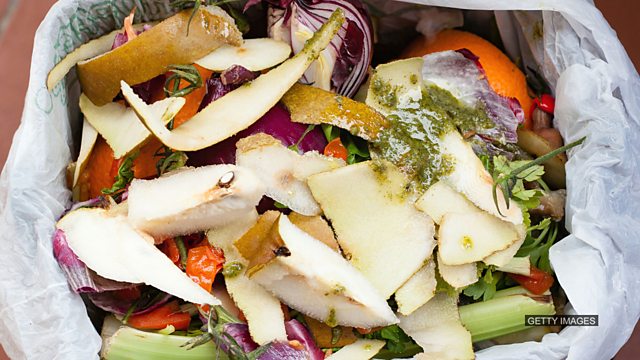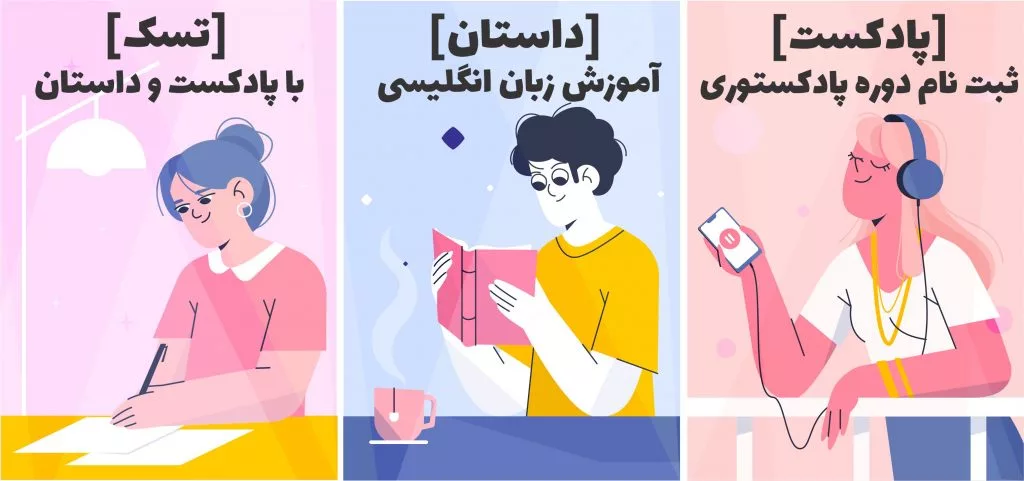پادکست انگلیسی BBC – زباله
در پادکست انگلیسی BBC – زباله ، درباره میزان تولید زباله صحبت میشه. انجمنها و فعالین حوزه محیط زیست راهکارهایی برای کمتر شدن زباله تولیدی میگویند. اگر شما هم نسبت به آینده و طبیعت دغدغه مندید پیشنهاد میکنم سوای آموزش زبان به دید اصلاح در روند تولید زبالههای منزل خود به این پادکست توجه کنید.
سوال پادکست انگلیسی BBC – زباله:
How much of the world’s food is wasted each year?
a) a half
b) a third
c) a quarter
به پادکست خوب گوش کن تا جواب رو پیدا کنی.
اگر می خوای گوش دادن به پادکست تا حد امکان برات ساده و کارآمد باشه مراحل زیر را دنبال کن:
هر روز به پادکست گوش کن. وقتی براش یه وقت ثابت در روز در نظر بگیری برات تبدیل به عادت میشه و این عادت هرروز پیشرفت میکنه.
پادکستی رو پیدا کن که موضوعش برات جالب باشه. وقتی از خود موضوع لذت ببری یادگیری هم برات لذتبخش میشه.
به پادکستی گوش کن که transcript یا متن داره. این بهت کمک می کنه تا کلمات و عبارات جدید رو به سرعت در متن پیدا کنی و ساختار انواع مختلف جمله رو خوب یاد بگیری.
پس از گوش دادن به پادکست با متن، در مرحله بعدی سعی کن بدون نگاه کردن به متن این کار رو انجام بدی. این کار مهارت شنیداری رو تقویت می کنه و کمک می کنه تا انگلیسی زبانان بومی را راحت تر درک کنی، حتی اگر خیلی سریع صحبت کنن.
اگه به پادکست انگلیسی گوش کردی و نتونستی کامل متوجه اش بشی، ناامید نشو. پادکست هایESL -English as Second Language بیشماری وجود دارن که برای سطوح مختلف، از ابتدایی تا پیشرفته طراحی شدن. مطمئنا هر روز می تونین یه پادکست مناسب با سطح خودت پیدا کنی.
فراموش نکن که هرچی بیشتر تمرین کنی در اون مهارت رشد میکنی! به قول انگلیسی ها: Practice makes perfect
واژگان کلیدی پادکست انگلیسی BBC - زباله
| معنی به فارسی | معنی به انگلیسی | واژه |
| هدر | something you throw away or lose without using or consuming | waste |
| باقیماندههای غذا یا یک وعده غذایی که خورده نشدهاند | the remains of food or a meal, which have not been eaten | leftovers |
| مکانی که زبالهها ریخته یا دفن میشوند | a place where rubbish is dropped or buried | landfill |
| نام شهرت | well-known by ordinary people of a particular place or culture | a household name |
| زیرساخت | the basic systems and services of a society | infrastructure |
| بیش از حد مورد نیاز | more than needed | abundance |
BBC 6 minute English -How much food do you waste?

برای دانلود پادکست روی سه نقطه سمت راست کلیک و گزینه Download را انتخاب کنید.
متن پادکست انگلیسی BBC - زباله
Dan
Hello and welcome to 6 Minute English– the show that brings you an interesting topic, authentic listening practice and six new items of vocabulary. I'm Dan…
Neil
And I’m Neil. In this episode we’ll be discussing food waste, just as soon as….
Dan
Neil, did you just throw the rest of that apple away?
Neil
Yeah. It was quite a big one and I couldn’t finish it.
Dan
Neil, you know you shouldn’t waste food.
Neil
Waste meaning to throw away without consuming or using. Ah, it’s only an apple. It’s not the end of the world, Dan.
Dan
Well, that’s where you could be wrong, my friend. Let me prove it to you, with this week’s question. How much of the world’s food is wasted each year?
a) a half
b) a third
c) a quarter
Neil
I’m not sure. I know it’s a lot so I’m going to say a) a half
Dan
We’ll find out if you’re right or not at the end of this show. So, the actual figure is 1.3 billion tons of food, which is enough to feed a billion hungry people. Where do you think all this food waste comes from?
Neil
Well, restaurants, I imagine. I mean, they can’t give one customer’s leftovers to another! That would be unhygienic!
Dan
Leftovers are the remains of food which has not been eaten. And while you are right, restaurants are not the main contributor to food waste.
Neil
Supermarkets! I bet they throw out loads of food once it goes past its sell-by-date, or the date which it can be legally sold by.
Dan
Think closer to home.
Neil
It’s us, isn’t it?
Dan
Yes. In Europe an incredible 53% of food waste comes from households, which results in 88 million tonnes of food waste a year. And I bet you can’t guess what we do with it?
Neil
I want to say recycle, but I can see from your face, Dan, that it’s not.
Dan
No. Unfortunately it goes into landfills and decays.
Neil
A landfill is a place where rubbish is buried. I see, so the food rots and this causes greenhouse gasses which lead to global warming and climate change.
Dan
Exactly, and the end of the world. But, remarkably the European country of Denmark has managed to reduce its food waste by a very significant 25%
Neil
That’s impressive, how did that happen?
Dan
They attribute it to a woman called Selina Juul.
Neil
I’ve heard about her. She became a household name in Denmark overnight!
Dan
A household name is one which everybody knows, and that’s right.
Neil
I thought she was Russian?
Dan
She is. But, I’ll let her explain.
INSERT
Selina Juul
I come from a country where there were food shortages, back then in Moscow, communism collapsed, we had the collapse of infrastructure, we were not sure we could get food on the table. And coming to Denmark, seeing this abundance, seeing these supermarkets filled with food. But then I was really shocked to see a lot of food getting wasted.
Neil
So Selina grew up in Moscow at a time when there wasn’t enough food because of the collapse of infrastructure, meaning the basic systems and services of a society – such as food transportation.
Dan
Then when she moved to Denmark, she found an abundance, or more than enough, food, but she saw it being wasted.
Neil
So she decided to do something about it?
Dan
Yes. She started a Facebook page in 2008 called ‘stop wasting food’ and 9 years later the Danish government credits her for their reduction in food waste.
Neil
How did she do it?
Dan
Well, lots of ideas really. She convinced some supermarkets to stop selling their items in bulk so that people buy only what they need. She’s produced a leftovers cookbook and she’s working with three governments to set up an education programme in schools.
Neil
Wow, she’s a busy woman. So how about you educate me with the answer to this week’s question.
Dan
Sure! I asked you how much of the world’s food is wasted each year?
a) a half
b) a third
c) a quarter
Neil
And I said a) a half
Dan
And I’m terribly sorry, mate, but you’re wrong. The answer is b) a third.
Neil
Well, it’s not as bad as I thought it was, at least.
Dan
Shall we look at the vocabulary then?
Neil
Yes, let’s. First we had waste. If you waste something, you throw it away or lose it without using it or consuming it. Common things we waste are food, time, money and energy. We also have some expressions with waste too. Can you think of one, Dan?
Dan
A waste of space is an expression which means a thing is completely without value. For example, I’m a complete waste of space in the kitchen. I can’t cook at all. Next we had leftovers. Leftovers are the remains of food or a meal, which have not been eaten. What do you tend to do with your leftovers, Neil?
Neil
Oh I love leftovers! Sometimes I think they taste even better than the original meal!
Dan
I agree! Pizza’s a great example!
Neil
Then we had landfill. A landfill is a place where rubbish is dropped and buried. In colloquial English we might say, a dump. Do you ever take your rubbish to the dump, Dan?
Dan
Not if I can help it. I prefer to recycle as much as possible. I only go to the dump if I have to get rid of a large appliance, such as a fridge. Then we had a household name. To be a household name is to be well-known by ordinary people of a particular place or culture. Can you think of a person who is a household name at the moment, Neil?
Neil
Oh, that’s very easy. Donald Trump springs to mind! Everyone must know who he is. Then we had infrastructure. Infrastructure is the basic systems and services of a society – such as electricity supply, trains, and roads.
Dan
And finally we had abundance. If you have an abundance of something, you have more than you need. Do have anything in abundance, Neil?
Neil
Well, when it comes to my children I have to have an abundance of patience….well, most of the time. And, that's the end of today's 6 Minute English. Please join us again soon!
Dan
And we are on social media too - Facebook, Twitter, Instagram and YouTube. See you there.
Both
Bye!
امیدوارم از پادکست انگلیسی BBC - زباله لذت برده باشید.
گوش دادن به پادکست روش خوبی برای تقویت مهارت شنیداری و هم چنین یادگرفتن کلمات در بستر یک موضوع خاصه که این به تقویت مهارت مکالمه انگلیسی نیز کمک زیادی می کنه.
اگه تو هم از اون آدمهایی هستی که از گوش دادن به پادکست لذت می بره برات یه خبر خوب دارم! آموزشگاه زبان انگلیسی 24talk یه دوره طراحی کرده مبتنی بر پادکست و داستان کوتاه به اسم "پادکستوری - Podcastory". این دوره سعی کرده یادگیری زبان انگلیسی رو مناسب با نیاز و سطح زبان آموز به یه فرایند بسیار مفرح، موثر، سریع و کم هزینه تبدیل کنه.
همین الان می تونی با کلیک روی عکس زیر و ثبت نام در دوره ی آموزش زبان انگلیسی با پادکست و داستان ۲۴talk اولین و مهم ترین قدم رو برای یادگیری زبان انگلیسی برداری. وقت رو از دست نده!
دوره پادکستوری آکادمی مجازی 24talk
برای شنیدن دیگر پادکست ها، به بخش پادکست در مرکز آموزش رایگان مراجعه نمایید.









